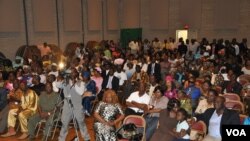Many Africans are leaving the United States and other Western countries and returning to their respective countries.
Jacob Sax Conteh is editor of Cocorioko, a Sierra Leone online magazine, which recently carried an article about the topic.
He said economic decline and disappearing jobs in the West, has been a driving force behind this reversed migration.
“Way back in the ‘70s and ‘80s, Africans came here [to the United States] because they could easily find jobs. But, since the economic downturn 10 years ago, especially in the past five years, jobs are drying up. So, many folks have decided to go back home and look for new opportunities,” he said.
Conteh said even the nursing and caregiving fields which used to be the only reliable sources of employment for many African immigrants, are also affected by non-hiring policies, layoffs and cutbacks.
“It used to be when you came here you could just take a three-month course and you can become a CNA (certified nursing assistant), you could have a private job of working at a nursing home. But, many of those jobs have disappeared because many companies are cutting back. Now, hospitals, the main hiring agencies, are looking for people with Bachelor Degrees [from college] and for somebody who has been here for 20 years or more; it’s very hard to go back to school,” he said.
Conteh said Africa’s promising economic outlook, including mining and oil, has also been a factor behind this reversed migration.
He said some Africans have been returning home to seek political offices or to get jobs in the governments.
“That’s a huge trend in the Sierra Leonean community because, right now, we have the All Peoples Congress Party in power. Many in the Diaspora supported this party when things were hard. So, many are going back looking for jobs, and some have gotten good jobs,” he said.
Conteh said African journalists and those returning home have a responsibility to educate young Africans who might be dreaming about leaving for the United States and other Western countries. He warned winning the U.S. visa lottery is not a guarantee that they will find jobs when they arrive.
“It’s very, very important for people to know that there are many, many millions of Americans who are out of jobs; there are millions of Americans that are homeless. So, just because you won the lottery and came with a Green Card, it doesn’t guarantee you a job,” Conteh said.
Jacob Sax Conteh is editor of Cocorioko, a Sierra Leone online magazine, which recently carried an article about the topic.
He said economic decline and disappearing jobs in the West, has been a driving force behind this reversed migration.
“Way back in the ‘70s and ‘80s, Africans came here [to the United States] because they could easily find jobs. But, since the economic downturn 10 years ago, especially in the past five years, jobs are drying up. So, many folks have decided to go back home and look for new opportunities,” he said.
Conteh said even the nursing and caregiving fields which used to be the only reliable sources of employment for many African immigrants, are also affected by non-hiring policies, layoffs and cutbacks.
“It used to be when you came here you could just take a three-month course and you can become a CNA (certified nursing assistant), you could have a private job of working at a nursing home. But, many of those jobs have disappeared because many companies are cutting back. Now, hospitals, the main hiring agencies, are looking for people with Bachelor Degrees [from college] and for somebody who has been here for 20 years or more; it’s very hard to go back to school,” he said.
Conteh said Africa’s promising economic outlook, including mining and oil, has also been a factor behind this reversed migration.
He said some Africans have been returning home to seek political offices or to get jobs in the governments.
“That’s a huge trend in the Sierra Leonean community because, right now, we have the All Peoples Congress Party in power. Many in the Diaspora supported this party when things were hard. So, many are going back looking for jobs, and some have gotten good jobs,” he said.
Conteh said African journalists and those returning home have a responsibility to educate young Africans who might be dreaming about leaving for the United States and other Western countries. He warned winning the U.S. visa lottery is not a guarantee that they will find jobs when they arrive.
“It’s very, very important for people to know that there are many, many millions of Americans who are out of jobs; there are millions of Americans that are homeless. So, just because you won the lottery and came with a Green Card, it doesn’t guarantee you a job,” Conteh said.






